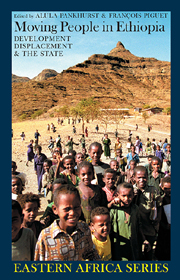Book contents
- Frontmatter
- Contents
- Acknowledgements
- Acronyms
- Glossary
- Notes on Contributors
- Preface: An Original Contribution to Country-wide Displacement Analysis
- Foreword by Alula Pankhurst & François Piguet
- Map
- Part I INTRODUCTION
- Part II THEORETICAL & INTERNATIONAL PERSPECTIVES
- 2 Refugees & Forced Resettlers
- 3 Why Do Things Often Go Wrong in Resettlement Projects?
- Part III DEVELOPMENT-INDUCED DISPLACEMENT
- Part IV THE EXPERIENCE OF STATE-ORGANIZED RESETTLEMENT
- Part V THE DILEMMAS OF REFUGEES, RETURNEES & DISPLACED GROUPS
- Part VI CONCLUSION
- Bibliography
- Index
- EASTERN AFRICAN STUDIES
3 - Why Do Things Often Go Wrong in Resettlement Projects?
from Part II - THEORETICAL & INTERNATIONAL PERSPECTIVES
Published online by Cambridge University Press: 05 April 2013
- Frontmatter
- Contents
- Acknowledgements
- Acronyms
- Glossary
- Notes on Contributors
- Preface: An Original Contribution to Country-wide Displacement Analysis
- Foreword by Alula Pankhurst & François Piguet
- Map
- Part I INTRODUCTION
- Part II THEORETICAL & INTERNATIONAL PERSPECTIVES
- 2 Refugees & Forced Resettlers
- 3 Why Do Things Often Go Wrong in Resettlement Projects?
- Part III DEVELOPMENT-INDUCED DISPLACEMENT
- Part IV THE EXPERIENCE OF STATE-ORGANIZED RESETTLEMENT
- Part V THE DILEMMAS OF REFUGEES, RETURNEES & DISPLACED GROUPS
- Part VI CONCLUSION
- Bibliography
- Index
- EASTERN AFRICAN STUDIES
Summary
Introductory remarks
WHY SUCH A NEGATIVE TITLE?
This chapter develops a framework to explain why it is that things so often turn out badly for the resettled people and host populations affected by the resettlement. It is not necessarily the case that resettlement will always turn out badly for the affected people. But if we are to do something constructive about it, we have to start with the reality that on the whole the news is not good, and that cases where resettled people are better-off, or even better-off in some ways, for having been resettled, seem rather few and far between. Why not start with the good news?
Cases that could be termed either successful, or partly so, include: the Egyptian side of the Aswan Dam resettlement; aspects of the Kainji Dam resettlement in Nigeria; the Rican Arenal Hydroelectric project in Costa Rica; the Urra 1 project in Colombia; and, of course, resettlement arising out of the Shuikou and Xiaolangdi Dams in China. The two Latin American cases were still at a relatively early stage at the time of the reports that suggested that they were successful (Partridge 1993; de Castro Illera and Egre 2000). Aswan's positive trajectory after ten years of looking like failing seems to relate to very case-specific circumstances (Fernea and Fernea 1991; Fernea 1998). With Kainji, agricultural success resulted from the dam, but, seemingly, more as serendipity than because of anything the project did.
- Type
- Chapter
- Information
- Moving People in EthiopiaDevelopment, Displacement and the State, pp. 35 - 48Publisher: Boydell & BrewerPrint publication year: 2009



